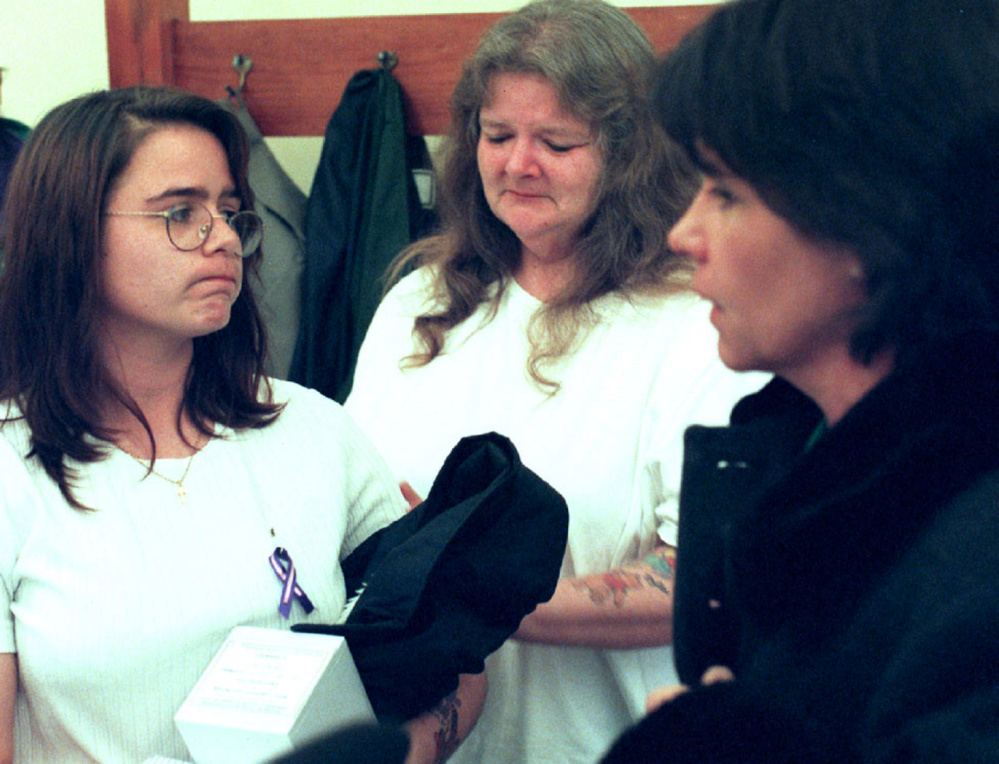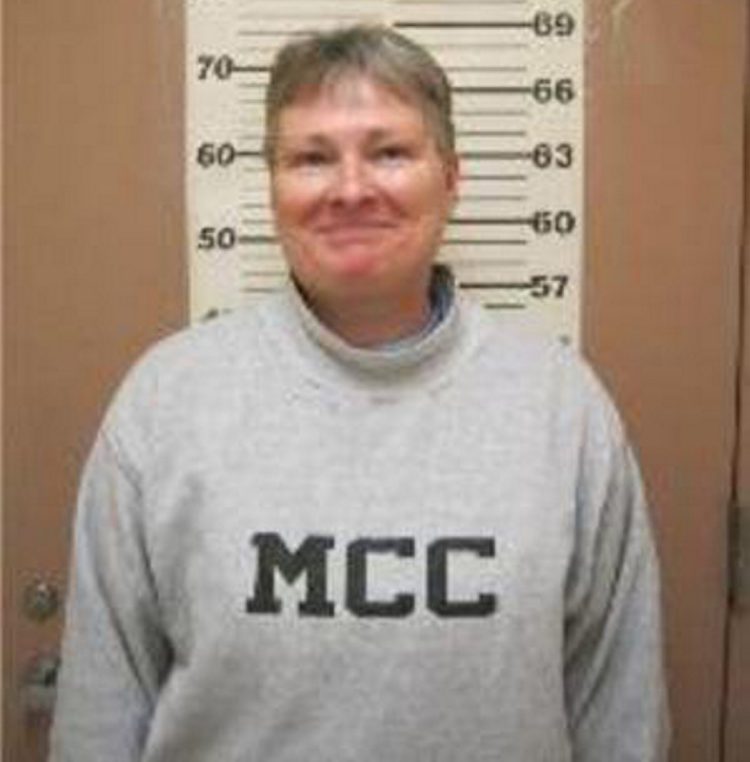Christy Darling is beside herself knowing that the woman who suffocated her kindergarten-age daughter 16 years ago will be released from prison in just over a month.
Darling, 39, feels it’s more than an injustice; it tarnishes the very memory of her daughter, Logan Marr.
Sally Ann Schofield, 55, a former state child caseworker who suffocated the 5-year-old foster child with duct tape, was convicted of manslaughter and sentenced to 17 years in prison. Schofield remains at the Maine Correctional Center in Windham and is to be released on probation April 25.
“I can’t believe it’s happening,” Darling said in an interview. “There’s no peace and justice for (Logan). It just must be nice to walk around free knowing you killed a child while the rest of us sit around and suffer. It blows my mind.”
Logan and her younger sister, Bailey, had been taken away from Darling — then known as Christy M. Baker — and placed at a series of foster homes before being moved to Schofield’s home in Chelsea. At the time, Schofield was a supervisor in the state Department of Health and Human Services, and the placement violated state rules.
In 2002, Schofield was convicted of killing Logan a year earlier by wrapping the hysterical-acting child in 47 feet of duct tape, some of it covering her mouth. The girl was bound to a highchair and left alone in a basement, where she was later found unresponsive.
After Logan’s death, Bailey was returned to her mother.
The shocking case spurred reform throughout DHHS, leading to sweeping changes in Maine’s child welfare system, including an effort to place children with relatives rather than in foster care.
The state continually has notified Darling of any change in Schofield’s status, and Darling has weighed in on some proposals, including objecting to a request from Schofield to be put on home confinement rather than remain in prison — a request that was later rejected.
“I slammed my feet a million times on the floor,” Darling said. “They wanted to do it around Logan’s birthday. I said, ‘Oh, hell no.'”
Logan was born Oct. 14, 1995.
The latest missive from the state to Darling was about Schofield’s imminent release from prison, April 25, onto probation.
An attempt to reach Schofield via family members was unsuccessful. A woman who answered the phone at Schofield’s husband’s home hung up.
A policy on the Maine Correctional Center website says, “We do not accept incoming phone calls for prisoners.”
‘I’M PRETTY TIRED’
Schofield’s release, meanwhile, is coming at a particularly strenuous time for Darling, who lives in Durham.
She also is dealing with a form of lung cancer that has metastasized to her right leg. Darling received the diagnosis of nonsmall-cell lung cancer in January, a day or so before the 16-year anniversary of Logan’s death.
“I just went through my first chemotherapy appointment,” Darling said. “I’m pretty tired.”
She’s had five bouts of radiation to try to shrink the tumors in her kneecap, and she’s been told to let the leg rest and recover.
“I go between a walker, a wheelchair and a cane, whatever’s easiest,” she said.
Darling, who works for L.L. Bean, currently is receiving short-term disability payments. She depends on her wife, Audra, for help and support. Currently, the couple is living with Darling’s family, several of whom smoke, so Darling is hoping to get into a smoke-free environment.
“It’s their home,” Darling said. “We can’t expect them not to smoke.”
She has started a gofundme page, www.gofundme #teamchristy as well, and would use those contributions to help defray costs that are not covered by medical insurance, including a move to a wheelchair-friendly residence closer to her doctors in Scarborough. As of Friday, contributions were approaching the first $1,000 of her $13,000 goal.
Donations have come from all over, including from people directly linked to Logan and the investigation into the girl’s death Jan. 31, 2001, in the unfinished basement of Schofield’s Chelsea home.
Darling takes comfort from her wife and family and from her surviving daughter. “Bailey is wonderful,” Darling said. “She’s 18 and on her own. She’s a good kid. I wouldn’t trade her for the world.”
Darling repeated a request she has made several times in the past: “Don’t forget Logan’s voice. Just don’t forget her voice.”
GASPING FOR BREATH
In a nonjury trial that took place in June 2002 in Bath, Schofield was acquitted of depraved indifference murder but convicted of reckless or criminally negligent manslaughter.
To illustrate the crime for the judge, William Stokes, one of the prosecutors in the case, took 47 feet of duct tape and wound it around and around a life-size doll in a child’s highchair just like the one Schofield placed Logan in for a time-out as punishment for what Schofield said was misbehavior.
Investigators found that length of duct tape — some of it with evidence of Logan’s saliva and small hairs from the skin between her mouth and nose — near the tipped-over highchair on the basement floor.
The judge at the time, Thomas Delahanty — who was ousted recently as Maine’s U.S. Attorney by the Trump administration — said any remorse Schofield expressed was minimized by her argument at trial that Logan died from a seizure rather than asphyxiation caused by Schofield. He described Logan’s death as “slow and agonizing and with substantial suffering.”
When he originally sentenced Schofield to 28 years in prison with eight suspended, Delahanty ruled Logan’s death to be among the most severe cases of manslaughter. She appealed, and the Maine Supreme Judicial Court ruled that Schofield must be resentenced because she had not been given the option of a jury trial to determine whether the crime rose to the standard of being the “most heinous and violent” to merit more than 20 years.
Delahanty determined nothing had changed since Schofield’s original sentence to lessen the seriousness of her crime, and he handed down the maximum sentence now possible — 20 years. He suspended three years so he could include a period of probation.
Conditions of Schofield’s probation prohibit her from contact with children under 16 except for her own children and those of her relatives with supervision and permission of her probation officer.
Schofield also was ordered to do 500 hours of public service work not involving children within 24 months of probation. However, a judge later agreed that Schofield’s public service work behind bars — provided it was documented by a supervisor — could count toward that.
Stokes said at the time that the state accepted a sentence of no more than 20 years to spare putting Logan’s family through another painful trial, during which the grotesque specifics of her death would be recounted.
“Gasping for breath is not an easy way to die. It’s a hard way to die, ” Stokes said in arguing at the time for the maximum penalty. “This certainly does border on torture.”
Betty Adams — 621-5631
Twitter: @betadams
Send questions/comments to the editors.








Comments are no longer available on this story